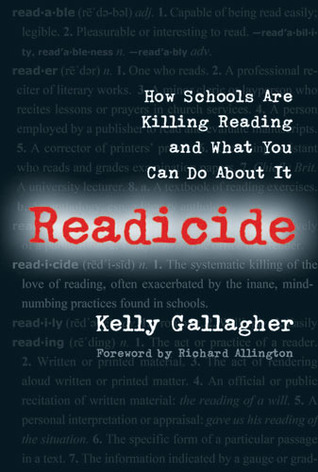Middle school students are very social creatures (for the most part). They enjoy talking, debating, and listening to what others have to say (well, okay, maybe they are working on the listening part).
Anyhow, after reading Readicide by Kelly Gallagher,
I decided to revisit my approach to teaching The Outsiders this year. Last year, I required students to find quotes from each chapter that addressed our essential questions. Not only did they have to find the quotes, they had to provide the context and an analysis of each one. I will admit that we had some great discussions using this method. However, what better way to kill the love of a book than to require students to stop every few pages and complete a quote response? Gallagher asserts that there is a happy medium, and I agree!
This year I assigned three chapters as homework. Students read the chapters without interruption. In class, I numbered them off. Each number correlated to an assigned chapter, and students had to then revisit the chapter to find a quote that they felt was most important. They had to write an analysis of the quote, as well as explain the context.
 |
| An excellent STUDENT SELECTED quote |
 |
| Student selected quote addressing the essential question regarding loyalty |
 |
| Nice response! |
What really impressed me was how respectful they were! Even if they didn't speak, the demonstrated good listening skills. I feel all students gained a deeper understanding of the chapters after participating in the fish bowl activity.
 |
| The people on the outside are observing those in the fish bowl. |
Also, this activity addresses so many of the Common Core Standards
Comprehension and Collaboration:
CCSS.ELA-LITERACY.SL.7.1
Engage effectively in a range of collaborative discussions (one-on-one, in groups, and teacher-led) with diverse partners on grade 7 topics, texts, and issues, building on others' ideas and expressing their own clearly.
Engage effectively in a range of collaborative discussions (one-on-one, in groups, and teacher-led) with diverse partners on grade 7 topics, texts, and issues, building on others' ideas and expressing their own clearly.
CCSS.ELA-LITERACY.SL.7.1.A
Come to discussions prepared, having read or researched material under study; explicitly draw on that preparation by referring to evidence on the topic, text, or issue to probe and reflect on ideas under discussion.
Come to discussions prepared, having read or researched material under study; explicitly draw on that preparation by referring to evidence on the topic, text, or issue to probe and reflect on ideas under discussion.
CCSS.ELA-LITERACY.SL.7.1.B
Follow rules for collegial discussions, track progress toward specific goals and deadlines, and define individual roles as needed.
Follow rules for collegial discussions, track progress toward specific goals and deadlines, and define individual roles as needed.
CCSS.ELA-LITERACY.SL.7.1.C
Pose questions that elicit elaboration and respond to others' questions and comments with relevant observations and ideas that bring the discussion back on topic as needed.
Pose questions that elicit elaboration and respond to others' questions and comments with relevant observations and ideas that bring the discussion back on topic as needed.
CCSS.ELA-LITERACY.SL.7.1.D
Acknowledge new information expressed by others and, when warranted, modify their own views.
Acknowledge new information expressed by others and, when warranted, modify their own views.



Karney is the best teacher ever!
ReplyDeleteAww! Thank you so much! I love my students, and they bring me so much joy!
DeleteYou inspire me to be a better teacher
ReplyDeleteThank you so much. I am inspired by so many people, so I am glad that I can be an inspiration, as well!
Delete